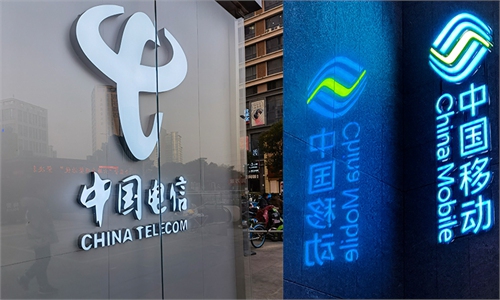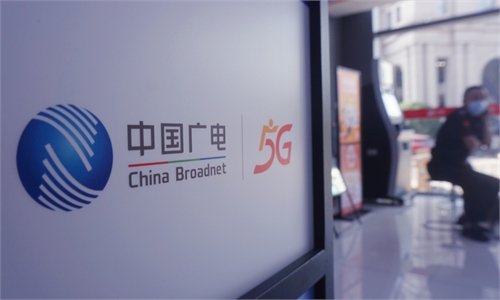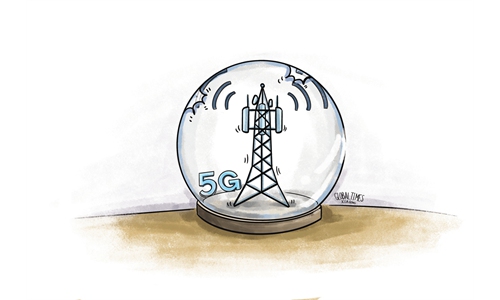
Chinese telecom operators Photo: VCG
In its latest move to thwart Chinese companies in the telecommunications sector, the US on Tuesday added equipment and services from two new Chinese firms to a blacklist, citing so-called threats to US national security.
The latest crackdown followed intensive US moves to bar other Chinese telecom companies in the US, including China Telecom and China Mobile, which will hurt the business environment and development of America's own telecom industry, officials and experts said.
The Public Safety and Homeland Security Bureau of the US Federal Communications Commission (FCC) on Tuesday added equipment and services from two entities - Pacific Network Corp and its wholly owned subsidiary ComNet (USA) LLC and China Unicom (Americas) Operations Ltd - to its covered list of communications equipment and services that have been "deemed a threat to national security," according to a press release from the FCC.
China's Foreign Ministry responded on Wednesday, saying that this is another case of the US government abusing its power to impose an unreasonable crackdown on Chinese companies.
The move by the US violates the rules of the market economy and undermines the international economic and trade order, which has seriously damaged the interests of Chinese enterprises, Foreign Ministry spokesperson Wang Wenbin said.
"We urge the US side to immediately correct its mistakes and stop unjustifiably containing and suppressing Chinese companies," Wang added.
The FCC's crackdown on Chinese telecom industry is an extreme manifestation of the deliberate generalization of so-called national security, Chen Jia, an independent research fellow of international strategy, told the Global Times on Wednesday.
Although the Biden administration has been pushing against China on all sides, it has only led to lingering inflation, erratic interest rate hikes, and a rising risk of economic recession, Chen said.
"In the long run, these policies will not only hurt globalization and world economic growth, but also systematically degrade America's market environment and Americans' livelihood," Chen said.
The US has been stepping up efforts to crack down on Chinese telecom operators in recent years. The inclusion of the two Chinese companies pushed the total number of Chinese companies on the list to nine, covering all three major telecom operators in China.
In March, the US regulator added equipment and services from two Chinese entities - China Telecom (Americas) Corp and China Mobile International USA Inc. In March 2021, it put five Chinese companies on the list - Huawei, ZTE, Hytera Communications, Hikvision and Dahua Technology Co.
All major Chinese telecom and equipment enterprises have been forced to withdraw from the US market, which will be a huge loss for the US telecom industry and widen the gap between China and the US, Xiang Ligang, a veteran analyst of the telecom industry, told the Global Times on Wednesday.
Inclusion on the covered list means money from the FCC's $8 billion Universal Service Fund may not be used to purchase or maintain products from the companies. The fund supports telecommunications for rural areas, low-income consumers and facilities such as schools, libraries and hospitals, Reuters said.
For Chinese firms, being included on the list has a limited impact on revenue or operations due to the tiny business there, Xiang said.
"The unreasonable ban on cost-effective, high-quality Chinese equipment will be a big loss for the US, affecting its network construction, base station construction and communication services," Xiang said, noting that the US has lagged behind China in telecom development.
US wireless providers' capital expenditures reached an all-time high in 2021, said the US Cellular Telecommunications & Internet Association (CTIA). US providers invested $35 billion into growing, improving and running their networks in 2021 and less than 70,000 new cell sites were built in the US between 2019 and 2021, according to CTIA.
In comparison, China added 650,000 new cell sites in 2021 alone, with an investment of 184.9 billion yuan ($26.12 billion), according to a report issued by the Ministry of Industry and Information Technology.



